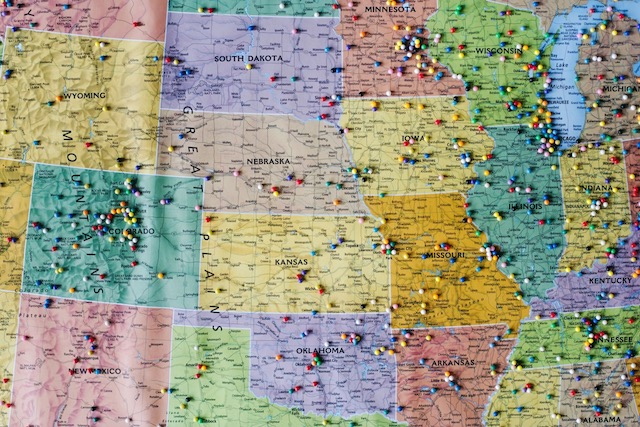Understanding sales tax rates can be tricky. But there’s one quick way to help you begin to understand what you should be charging your customers in your home state. The first thing you need to do is find out if you run your business out of an origin-based state or a destination-based state.
**Important to note: Use this information to find the sales tax rate you should be charging in your home-base state only. States have different rules for out-of-state sellers who are selling into their states.**
This guide will help you answer these fundamental sales tax questions:
- How much sales tax should I charge to buyers in my home state, and at what rates?
- Do I charge the same rate for every customer?
- Am I supposed to charge a rate based on where the customer is located?
- How much sales tax should I charge to buyers in states where I am considered a “remote seller”?
In origin-based states, sales tax should be collected based on where you, the seller, are located.
Let’s say, for example, you live and/or sell out of Carlisle Pennsylvania. Since Pennsylvania is an origin-based state, you charge all customers located in PA the same sales tax rate (six percent) no matter where they live. If you live and/or sell out of Philadelphia, you’re required to charge that same six percent PLUS a local tax of two percent to all of your customers in PA.
List of origin-based sales tax states
Here are all of the origin-based states. If you live in one of these states, you should be charging everyone in your state the rate for where your business is located. That rate could include a combination of state, county, city, and district tax rates.
* California is unique. It’s a modified origin state where state, county and city taxes are based on the origin, but district taxes are based on the destination (the buyer).
Unfortunately, there are not many origin-based states. Most states follow the ever-increasingly-confusing destination-based system. In destination-based states, the correct sales tax rate is based on where the buyer is located (the destination of the sale). The reason this can be more confusing than origin-based states is that states can have hundreds of tax jurisdictions, meaning you could potentially have to charge hundreds of different tax rates.
Here’s an example. Let’s say you live and/or sell in Columbia, South Carolina. You sell a taxable product to a customer in Chesterfield, SC. According to the State of South Carolina Department of Revenue, you are required to charge that customer 8% sales tax. That 8% is the sum of the state rate of 6% PLUS a 2% local tax.
List of destination-based sales tax states
Here are all of the destination-based states. If you live in one of these states, you should be charging everyone in your state the rate where the item is being delivered. That could include a combination of state, county, city, and district tax rates.
- Alabama
- Arkansas
- Colorado
- Connecticut
- District of Columbia
- Florida
- Georgia
- Hawaii
- Idaho
- Indiana
- Iowa
- Kansas
- Kentucky
- Louisiana
- Maine
- Maryland
- Massachusetts
- Michigan
- Minnesota
- Nebraska
- Nevada
- New Jersey
- New Mexico (as of 7/1/21)
- New York
- North Carolina
- North Dakota
- Oklahoma
- Rhode Island
- South Carolina
- South Dakota
- Vermont
- Washington
- West Virginia
- Wisconsin
- Wyoming
Origin vs. destination based sales tax for remote sellers
If you have sales tax nexus in multiple states, there’s more to the story. States have a whole different set of rules when it comes to “remote sellers.” A state considers you a remote seller if you have sales tax nexus in that state but are not based there. (In a state’s terminology, they call this “use tax.” But “use tax” is basically the same thing as sales tax, only as applied to remote-sellers.)
For example, you sell via Amazon FBA and live in Georgia, but your products are shipped to a warehouse in Tennessee. Tennessee would consider you a remote seller. If you were based in Tennessee, you would charge sales tax based on the rate at your business’s location, because Tennessee is an origin-based sales tax state. But Tennessee is actually a destination-based sales tax state when it comes to remote sellers. So if your business is based in Georgia but have sales tax nexus in Tennessee you would do one of two things:
1.) Charge sales tax at the rate of your buyer’s ship to location
2.) Charge a flat 9.25%
Rule of thumb: States treat in-state sellers and remote sellers differently. Most of the time, if you are considered a “remote seller” in a state, that state wants you to charge the sales tax rate at your buyer’s destination. Some states allow out-of-state retailers to charge a flat use tax rate. Contact the state’s department of revenue if you have questions about what rate to charge.
What sales tax rate should I charge?
As an online seller, the first trick to sales tax compliance in your home-base state is to determine if your state is an origin-based (charge at the rate of the seller’s location) or destination-based (charge at the rate of the buyer’s location) state.
Then, if you have sales tax nexus in other states where you are considered a “remote seller,” determine if you should collect sales tax at an origin-based or destination rate in those states. (remember, most of the time you will collect at a destination-based rate in remote states.)
Frequently asked questions
1.) From which customers do I have to collect sales tax? Just customers in my state? Or multiple states?
You are required to collect sales tax from customers in states where you have sales tax nexus. Nexus means “a connection or tie” and can be established by having a presence in a state due to an office, store, warehouse or other presence (including working from your home), an employee, contractor or sales person, an affiliate, economic nexus, or storing goods in a warehouse. If you have nexus in a state, you must collect sales tax from all buyers in that state. Some online sellers will have sales tax nexus in multiple states.
2.) I think I was erroneously charged sales tax. Why could that be? – Businesses are required to charge sales tax in states where they have sales tax nexus (i.e. presence.) So this is one reason why you may be charged sales tax. Also, sales tax is based on a the ship-to address. So if you live in a state with no sales tax, but order something for your nephew in a state that does have sales tax, you may be charged sales tax based on the sales tax rate at the address where you ship the item. Those are just a couple of reasons why you may be charged sales tax when you weren’t expecting it.
3.) I was charged sales tax on the shipping charges on my online order. Why is this? – This depends on state laws. Some states require merchants to charge sales tax on shipping and handling charges, others don’t. Others require merchants to charge sales tax on shipping and handling should some conditions be met. You can read more about Sales Tax on Shipping Charges here.
4.) I sell on Amazon FBA. In which states do I need to collect sales tax?
Amazon FBA sellers have to deal with sales tax nexus in their home states and in remote states.
Want to learn more about how TaxJar can remove the burden of sales tax? Find out how TaxJar works and get started today.



